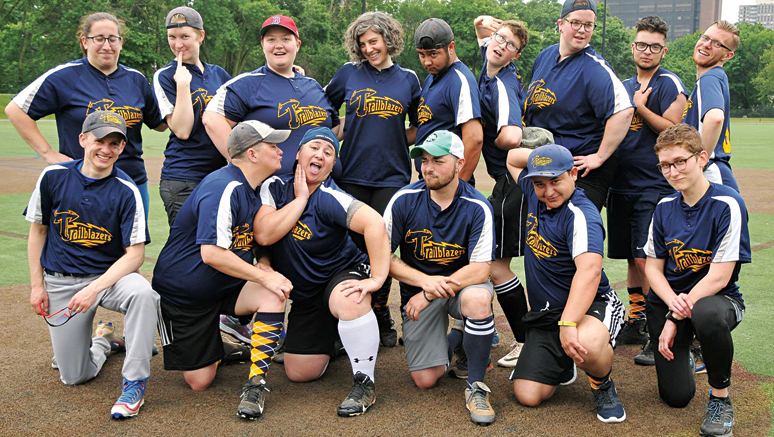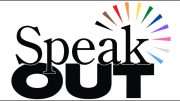New England Pride Guide 2018 | Special Edition
By: Al Gentile/TRT Reporter—
In the Boston area, amateur sports is an area where LGBTQ people are increasingly finding themselves, building community, and playing ball.
From football and softball to darts and running, LGBTQ-affirming sports teams in Boston and beyond bring a culture of sportsmanship, acceptance, and fun to the LGBTQ experience. The Rainbow Times explored this phenomenon through the lens of players, all of whom in different respects have navigated their own personal journeys through sport.
Robson Govine, for example, a transgender male who coaches and plays shortstop and left field on the trans-specific softball team, The Trailblazers, said before finding the team he had a difficult time feeling comfortable following his passion for sports.
“I actually spent a lot of time not playing sports because there wasn’t really a place for me to play,” Govine said. “I couldn’t play on women’s teams, and I didn’t feel comfortable playing on men’s teams because of my size.”
Govine, now 32, played various sports throughout his life including soccer and lacrosse. It was only at 27—just a year before embarking on his physical transition—that he found his place at Beantown Softball League and The Trailblazers.
“We were able to form trans-specific teams, focusing on making a space for trans folks to play sports, and so we play in a league that totally recognizes that, affirms that, and is really respectful of our players’ identities,” Govine said.
LGBTQ-affirming sports teams and leagues seem to have one quality in common: A culture that supports inclusiveness, emotional and physical development and exploration, and building community.
The following accounts are from people who found all these things and more through sport and who hope anyone looking for the same will see them on the diamond, pitch, or end zone.
“ … the first people we call … ”
For LGBTQ people navigating a largely heteronormative world, finding community can be difficult.
From his vantage point as vice president of the FLAG (Friends, Lesbians, and Gays) Flag Football League Adam Vavrek—a gay man—said their community was a garden where players blossomed.
“I’ve actually seen a lot of great stories come out of the league. I’ve seen people lose weight and lead more healthy lives through football. I’ve seen people meet their best friends and boyfriends, and eventually husbands through the league,” Vavrek said. “I’ve also seen some people who came out of the closet … and this is an environment where they would be accepted, making the whole process easier for them.”
For adults moving to a new city, finding friends is often difficult. As a newcomer to the Boston area, Vavrek said joining FLAG allowed him to establish his roots.
“I moved to Boston eight years ago, and I knew one person,” Vavrek said. “Joining the league has introduced me to a whole host of people, and gave me a friend group I could rely on, and made my move to Boston a lot more enjoyable.”
But community is about more than making friends. Govine, who began socially transitioning at the age of 22 and undertook the physical transition process at 27, found a deep sense of comradery in trying times.
Expanding his network helped Govine navigate the often tumultuous journey of transition, something he said was invaluable to his self-exploration.
“Before I physically transitioned, it helped me be at ease with the idea of transitioning,” he said. “I didn’t have outside support systems from my family and such. Having teammates that could talk to me about hormone replacement therapy, about surgery, and really help facilitate me through that process was really valuable.”
Alex Will, a gay male coach and player on the Boston Ironsides Rugby League, said the community he built around him helped in a great way off the field.
“I find myself as an adult coaching high school rugby now, something I could have never imagined doing,” Will said. “I get to create new relationships outside of the team, and I hope that’s true for all our players. People can take that and go back to their jobs, their hometowns, and their families with the sense of empowerment they’ve gained, and form even more relationships.”
As those relationships sparked on the field grow into their personal lives, players have found the gains go far beyond health and muscle mass.
“My whole life revolves around the team at this point,” Will said. “There’s this strong community of people who have come to the team, who have pulled people from their own world to foster these relationships. When we’re free on a Friday night, these are the first people we call. When we need help moving, these are the first people we call.”
Scoring Against Stigma
Throughout history, sports has served as an arena for change and greater awareness around social issues. National Football League player Colin Kaepernick famously kneeled during the National Anthem in 2016, and Jackie Robinson was the first black Major League Baseball player in several decades after Moses Fleetwood Walker played in the late 19th century.
James Stanton, a transgender man who also plays on the Trailblazers, said LGBTQ athletes can make an impact on the heteronormative world of sports.
“There’s incredible potential to use sports as a tool for breaking away from normative concepts of gender, and to foster deeper understanding about the intricacies of gender,” Stanton said. “You can see sports as another battleground for civil rights, not just in terms of gender and sexuality, but in terms of race and ethnicity, or immigration status.”
In many ways, according to Stanton, the sports world is a microcosm of society at large, where systemic change can be viewed and experienced in real-time.
“It’s another facet of society that has all the same issues as real society, but since it is a smaller subset, it’s where you can actually start to see actual systemic change,” Stanton said. “It’s got to start somewhere, so why not have it start on a playing field, and kind of build it from there?”
Will said LGBTQ-affirming sports teams are taking a shot at what he believes is a culture of “toxic masculinity.”
“There’s this strange tension about these traditionally homophobic sports and the culture they’ve created, and how we as LGBTQ people put our unique spin on it, and bring the best out of what sports teams have to offer and transform that,” Will said. “What is it like at the same time to have players who are openly making LGBTQ community jokes on the sidelines? What does it look like for us to have gay bars that sponsor us? This traditionally rough and tough sport has taken on this different LGBTQ flair based on people bringing their unique self to it.”
Even the social spaces LGBTQ-affirming teams inhabit have changed over the decades. Kevin Collins, who is commissioner of the Beantown Softball League, said though LGBTQ people struggle today, the playing field was no escape for historic social issues such as discrimination and the AIDS epidemic.
Launched in 1978, the Beantown Softball League began in a time when LGBTQ people were not accepted in society and on the field. Collins said stories of players who lived through the AIDS epidemic in the 1980s still haunt them today.
Having players who went together to teammates’ funerals is a somber memory Collins hopes new generations of LGBTQ athletes will remember.
“In the mid-80s, [the league] had a summer where they buried several players from the AIDS epidemic,” Collins said. “We’re not dealing with that now, [or] what the discrimination was like, people driving by and yelling ‘fag’ or whatever. We need to remember and respect those people who did it, went through that.”
Govine said stories and experiences from when The Trailblazers first formed and played in a league that was not LGBTQ-affirming sows gratitude for having joined up with the Beantown Softball League.
“The players on that team talked about experiencing discrimination in that league. That league had certain gender rules about how many people had to be women at a certain time,” Govine said. “They experienced a lot of disrespect, a lot of verbal comments from players in that league. They told me that after games they walked to their cars together because it was kind of not safe to walk by themselves.”
It’s Not About Skill—And That’s Part of the Point
Inclusiveness is one of several themes that span nearly all LGBTQ-affirming sports leagues in the area. A disregard for skill level, according to everyone interviewed for this piece, is adopted to that end.
As a player and administrator for The Trailblazers, Stanton said that members of the transgender community often see his team as a path toward a healthier lifestyle, a disregard for skill is often a saving grace.
“Particularly when we first started, those [safe] environments were very few and far between. It seemed unnecessary to throw up some kind of gate,” Stanton said. “Nobody wants to hear that when they’re looking for a proverbial liferaft in a churning sea. It is a part of our team’s mission to welcome people of all abilities.”
Many leagues are split up between divisions in much the same way as high school- and college-level sports. The lower levels are what Will believes is an entrance point.
“People always say to me that they’re not the right size for rugby. We have people of all sizes, and there’s a place for you,” Will said. “Where you are right now, that is all you need. If you give yourself up over to this, it can change your life.”
The path paved by different divisions, Collins said, is often one of personal development. He said Beantown’s New Player Clinic Days are demonstrations that anybody, even someone with no experience, has a position to play.
“[Many people] never really played sports in high school, and even youth sports because they were uncomfortable being around that macho, locker room-type atmosphere,” Collins said. “You see a lot of young players develop and move up. We have a spot for everyone always, and you don’t have to face that stress you had growing up.”
“A League of Their Own”
The 1992 film “A League of Their Own” saw actresses Geena Davis, Rosie O’Donnell, Madonna, and others portray women in the WWII world of baseball while playing in the first all-women leagues.
For the LGBTQ community—and according to Govine, the transgender community in particular—having a safe space in the sports world to call their own helps to overcome common challenges living in a heteronormative world.
“I’m in an environment where I don’t have to explain my gender identity to people, and every time I walk on the field I’m not worried about being [misgendered] because we’re starting each game saying our names and our pronouns,” Govine said. “It’s also this aspect of building an environment that’s supportive and doesn’t require an explanation on our part as trans people.”
Stanton believes the world of sports sheds a clear light on just how recreation has reinforced gender roles.
“Sports can highlight the sort of boxes that we are forced to put ourselves in, in a kind of crappy way,” Stanton said. “I’ve heard stories of shopping around for different leagues. We did try a league that had weird politics around gender roles that were the complete opposite of what [The Trailblazers] were trying to be.”
As the world of LGBTQ-affirming sports grows, Stanton said a major opportunity presents itself.
From the separation of leagues along gender lines to even the names of positions on the field, LGBTQ-affirming sports teams offer an engine to change the gendered characters sports has identified with for so long.
“When you start to think about going through a physical transition, or even just a social transition, there’s terminology that’s inherent in the system that makes it on tiny microscopic levels unnecessarily gendered,” Stanton said. “I guess part of our team’s learning about what that means—and the league as a whole learning what it means—is trying to break those down.”
“Not first baseman but just first base,” Stanton said, laughing.
Teamwork Makes the Team Work
Apart from allowing LGBTQ people to find out more about themselves and others, LGBTQ-affirming sports teams and leagues also bridge gaps between other communities.
LGBTQ-affirming sports teams have educated the cisgender community about the realities of LGBTQ people. Alternately, according to Will, it’s been a source for new allies.
“It’s one thing to have a team where GBT men feel safe in their group. It’s another thing to have that group expand to welcome people who identify as allies, or who don’t even understand that term yet but want to be a part of what we’re doing,” Will said. “I think it’s exactly what the world needs more of, in every way you could think of it. It’s great that a totally unsolicited guy wants to play on the team because, as they say, the culture we have is a culture they want to be a part of.”
Will said about a quarter of their rugby players identify as straight, something a lot of people find surprising.
“That’s a different dynamic—a lot of people think that a lot of those people are gay or trans or bi. That’s not true anymore,” Will said. “That provides specific opportunities for growth.”
It’s All About the Score
While LGBTQ-affirming teams face particular struggles in terms of acceptance, it appears there’s more than the game itself that these teams share with the sports world at large.
Evidently, those shared experiences are largely what Govine, Will, Collins, Stanton, and Vavrek see as the “inspirational moment” they strive for in their play—a love of building something beyond themselves, and for the sport they play.
For Vavrek, it’s about unleashing a player’s newfound potential.
“For me, it’s really watching others achieve something they haven’t achieved before. I really like seeing the best being brought out of other people,” Vavrek said. “This guy on my team last season scored his first touchdown, and he’s been with the league for about two years, and to be able to see him score and do something he didn’t think he was able to do was really emotional and powerful.”
For Govine, that moment is realizing he helped build a community.
“Ever since I switched over to coaching, the thing I strive for most as being part of this team is enabling my players to really feel like they’re part of something, and having a good time,” Govine said. “When I see my players having a good time, working cohesively as a team, that’s actually the moment. That’s the important thing for me—building that community around me.”
Will said the culture of the team, which fosters self-actualization, is the best part for him.
“[Rugby] both gave me the confidence to see my sexual orientation as part of the fullness of my life, between all these areas of our lives, and know that the integration of that part of our lives is part of the work of adulthood,” he said.
Stanton believes using sports as an engine for players to more deeply explore themselves is where the true score lies.
“The fact that we can offer [the team] as a haven, and offer it as a place for acceptance and encouragement and support, it’s pretty awesome,” Stanton said. “It plays a nice role in the overall journey for many members of the team.”
As for Collins, it’s all about the score.
“That moment for me is a close game—when you’re behind, and one of your guys or girls gets that hit that puts you ahead.”
To see a comprehensive list of LGBTQ-inclusive sports teams in the Boston area, visit BosGuy.







